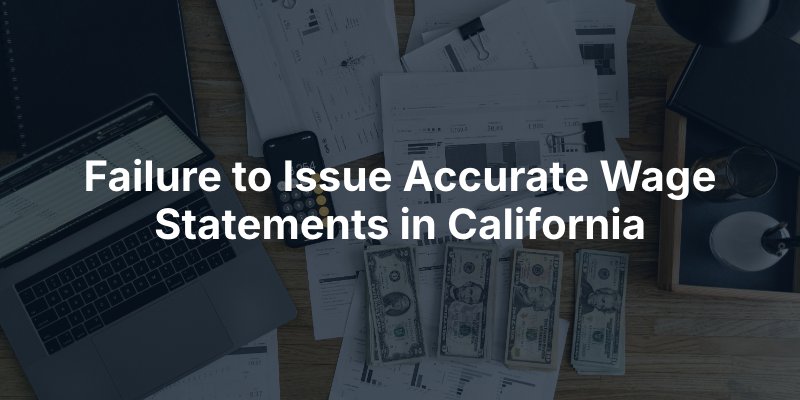California labor laws require employers to provide employees with accurate and itemized wage statements each pay period. A wage statement—often referred to as a pay stub—must include specific information to ensure transparency and protect workers from wage theft, underpayment, or other labor violations. When employers fail to comply with these legal requirements, they not only violate state law but may also face serious penalties and legal action.
If you have been provided inaccurate wage statements and facing underpayment, contact our Orange County wage and hour attorneys today. Call Aegis Law Firm at (949) 379-6250 today.

Under California Labor Code Section 226, employers must provide wage statements that include the following:
For piece-rate or commission-based employees, employers must also detail the applicable rate and number of units earned. These wage statements must be provided every pay period and must be accurate, legible, and complete.
Employers often make errors on wage statements that can result in labor code violations, including:
Even unintentional errors can result in legal liability. California law recognizes that inaccurate wage statements can harm employees by making it difficult to confirm proper payment, challenge wage theft, or understand deductions.
Employers who fail to issue accurate wage statements may face penalties under Labor Code § 226(e). Employees may be awarded:
In addition, employers may be responsible for paying court costs and attorney’s fees if the employee prevails in legal action. In more severe cases involving intentional fraud or wage theft, further damages may be pursued under California’s Private Attorneys General Act (PAGA).
If the inaccurate wage statements cause measurable harm—such as difficulty obtaining credit, financial loss, or inability to confirm proper payment—employees may recover actual damages resulting from the violation. You also may be entitled to recover reasonable attorney’s fees and the costs of litigation.
If you suspect your wage statements are inaccurate or incomplete, an experienced Orange County employment lawyer can help protect your rights. They will:
Wage statement violations are not minor technicalities—they affect your ability to verify your earnings and protect your livelihood. A knowledgeable employment lawyer can help you take action and hold your employer accountable. Contact us to discuss your legal options today.